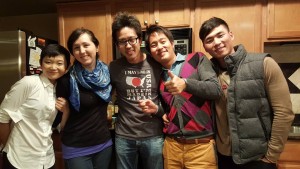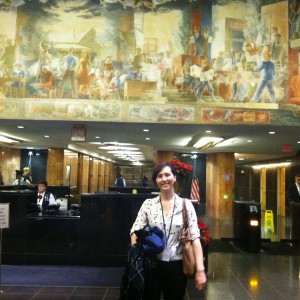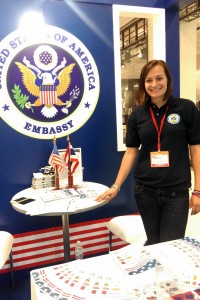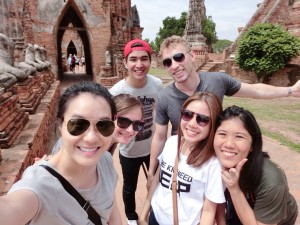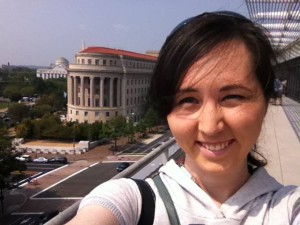
Beth Gawne spent three years teaching English in rural Japan before coming to the Maxwell School. She is a joint MPA/MAIR student who will finish with two degrees. She interned at the United States Department of State in Washington, DC and is a regular contributor to the PAIA Insider blog.
“And they will beat their swords into plowshares, and their spears into pruning hooks; nation will not lift up sword against nation, neither will they learn war anymore.” –Isaiah 2:4
This is a quote I saw often in a hallway of the Harry S Truman building of the State Department while I spent my Fall Semester learning about nonproliferation efforts in the US. This quote was written as a mural on the wall of the floor I worked on, and across from it was an image of a mushroom cloud from the first successful nuclear test of the Manhattan Project. It gave me inspiration and motivation as I worked in the front office of the Bureau of International Security and Nonproliferation (ISN), sitting in on meetings with high-level diplomats and representatives from the government, taking notes, and organizing briefing documents for the Assistant Secretary.
My time in the State Department provided me a 30,000-ft view of what the US does to prevent nuclear, biological, and chemical materials from being used as weapons, and instead to focus those efforts on peaceful means. I learned that these efforts range from formal treaties and conventions, to interdiction and export control, to even helping scientists overseas to prevent accidents or theft of dangerous materials. Even more, I learned about the slow moving machine that is the bureaucracy meant to ensure that these efforts are consistent and properly coordinated. I realized that without this, our government would spend its time responding to the latest crisis and be unable to do anything else long-term.
My job itself had me working alongside other staff assistants to make sure the leadership of the bureau was prepared for meetings and events. I got to see what makes a strong leader within the government, and I had the opportunity to work with some of the most engaging, kind, and supportive people I have ever met. I even was given a chance to do a few projects in other offices, helping with detailed data collection that was going to be used to impact a real problem on the ground. Knowing I was involved in something that would make a difference was probably one of the best parts of the internship overall. I wasn’t making copies and running to Starbucks; I was helping to communicate an argument for NATO or inform bureau officers of a country’s stance on an issue.
I was most impressed with the quality of the leadership within the bureau, and for people who have such important and high-level jobs, everyone was down-to-earth and welcoming. I’m excited to see what my future holds, and hopefully my path will cross with ISN once again— even if I’m not directly working there.
Read Beth’s latest contribution to the PAIA Insider blog:
Life as a Returning 2nd Year Student, AKA: Should you do a dual degree?
Learn more about the Maxwell-in-Washington program
